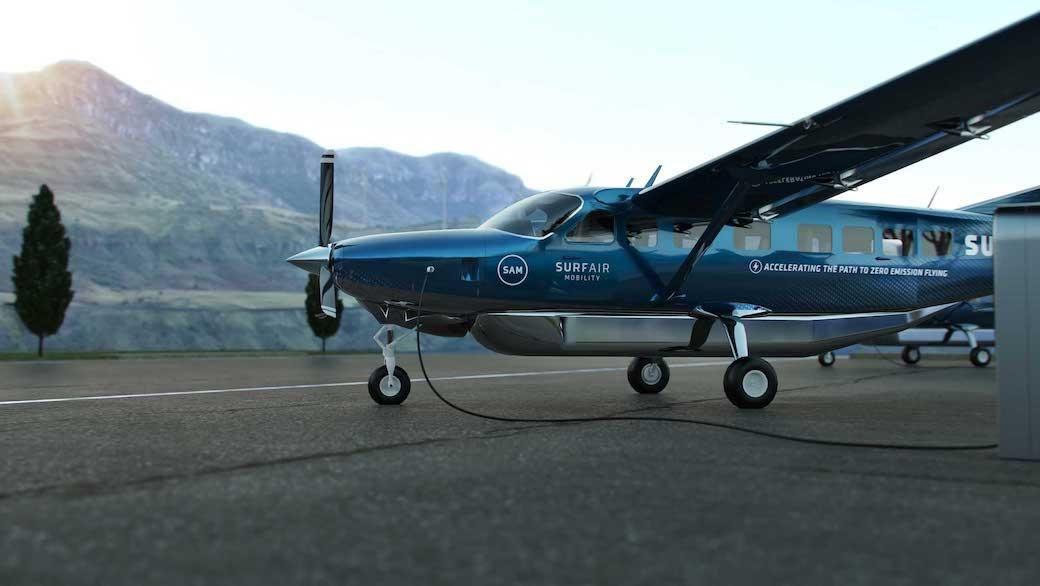
Surf Air Mobility has partnered with Textron to become the exclusive developer of electric and hybrid-electric retrofits for the Cessna Caravan.
U.S. startup Surf Air Mobility has partnered with Brazilian regional carrier Azul Conecta to electrify a portion of the carrier’s Cessna Caravan fleet, marking the first international sale for the newly public company.
The agreement with Azul Conecta covers both electric and hybrid-electric retrofits of the Cessna Caravan, which should cover the entirety of the carrier’s regional network in Brazil, while reducing operating costs by 25-50% compared to the carrier’s existing Caravan fleet, according to Surf Air CEO Stan Little, who also heads Southern Airways, which was acquired by Surf Air over the summer.
Azul Conecta currently operates a fleet of 28 Caravans. The companies did not specify exactly what percentage of the fleet would be covered by the deal.
“Azul Conecta and the leadership team there are highly focused on being at the forefront of electrification, and they want to be the first airline in Brazil that puts a paying passenger on an electric or hybrid-electric aircraft,” Little tells the AAM Report. “That’s been my position here in the U.S. for the last five or six years [as Southern Airways CEO], so when I met their CEO and we talked it over, I knew we would be totally aligned as early partners.”
Little describes how the strategic partnership initially came together last spring through a chance encounter with Azul founder David Neeleman at an event at electric seaglider startup Regent’s production facility in Rhode Island, for which Neeleman serves as a board member and strategic advisor.
Besides laying the groundwork for the Azul Conecta deal, the visit also foreshadowed a separate partnership launched between Surf Air and Regent to offer seaglider services in the Miami area, building on existing agreements between Regent and Surf Air companies Southern Airways and Mokulele Airlines.
“I had dinner with [Neeleman] the night before the event, and he introduced me to the CEO of Azul Conecta. From there we developed a relationship and four months later had this deal,” Little recounts. “I think this really came to be because of our mutual interest in the electric seaglider—and electrification more broadly—and our getting to spend that time together at the event.”
The agreement with Azul is notable because it represents the first international sale for Surf Air Mobility, which has an exclusive relationship with Textron to develop electric and hybrid powertrains for the Caravan. The company is currently in talks with other potential operators–both domestic and international–including in regions as far afield as Africa, where Little observes Caravans are highly utilized relative to other regions.
“We know, because of the nature of the Caravan, that we’re going to be deploying a lot of these Caravans outside the U.S.,” Little explains. “The flying done in Brazil and parts of Africa is unique–it’s not the same as flying from LA to San Francisco. We want to bring in as many of these partners as early as possible to be on our advisory board to help us as we go through the design phase so that we truly are designing a powertrain that meets the needs of our customers.”
The partnership with Azul Conecta comes several months after Surf Air concluded its direct listing on the New York Stock Exchange in July. The milestone allowed it to finalize its exclusive agreement with Textron–from which it has placed an order for up to 150 Caravans to retrofit, operate or sell to other operators.
The company is seeking FAA supplemental type certification (STC) for its electric and hybrid-electric variants, which are being designed to achieve ranges of 115 mi. (185 km) and 345 mi., respectively.
Little said that he considers Surf Air’s approach to retrofitting Cessna Caravans to be a competitive advantage that will provide an easier path to entry-into-service compared to competitors that are developing clean-sheet electric airplanes.
“We believe that we’re going to be among the first [to market], because we are simply looking to do a transition of an existing airframe,” he says. “The certification of an airframe, the wings and the moving parts–those are among the hardest parts of any certification process. And fortunately, Textron did that hard work for us 40 years ago.”
